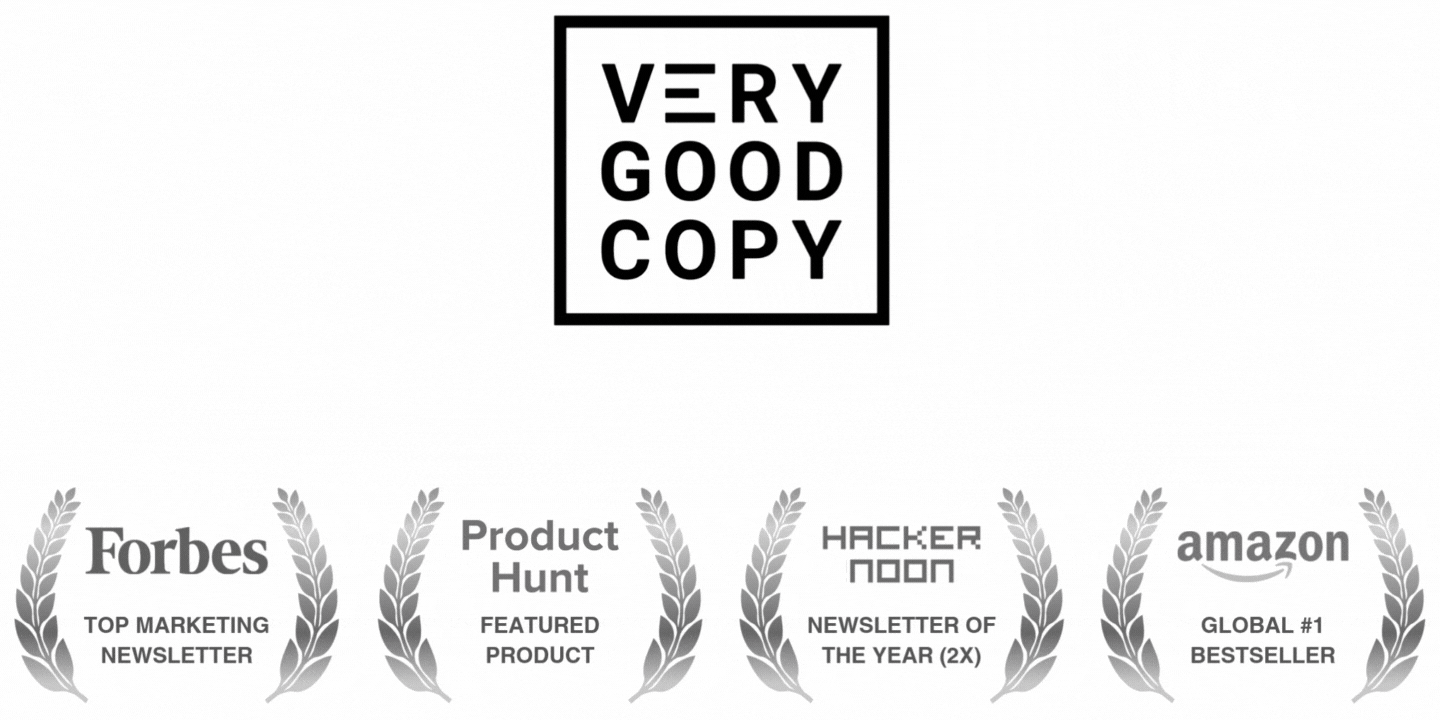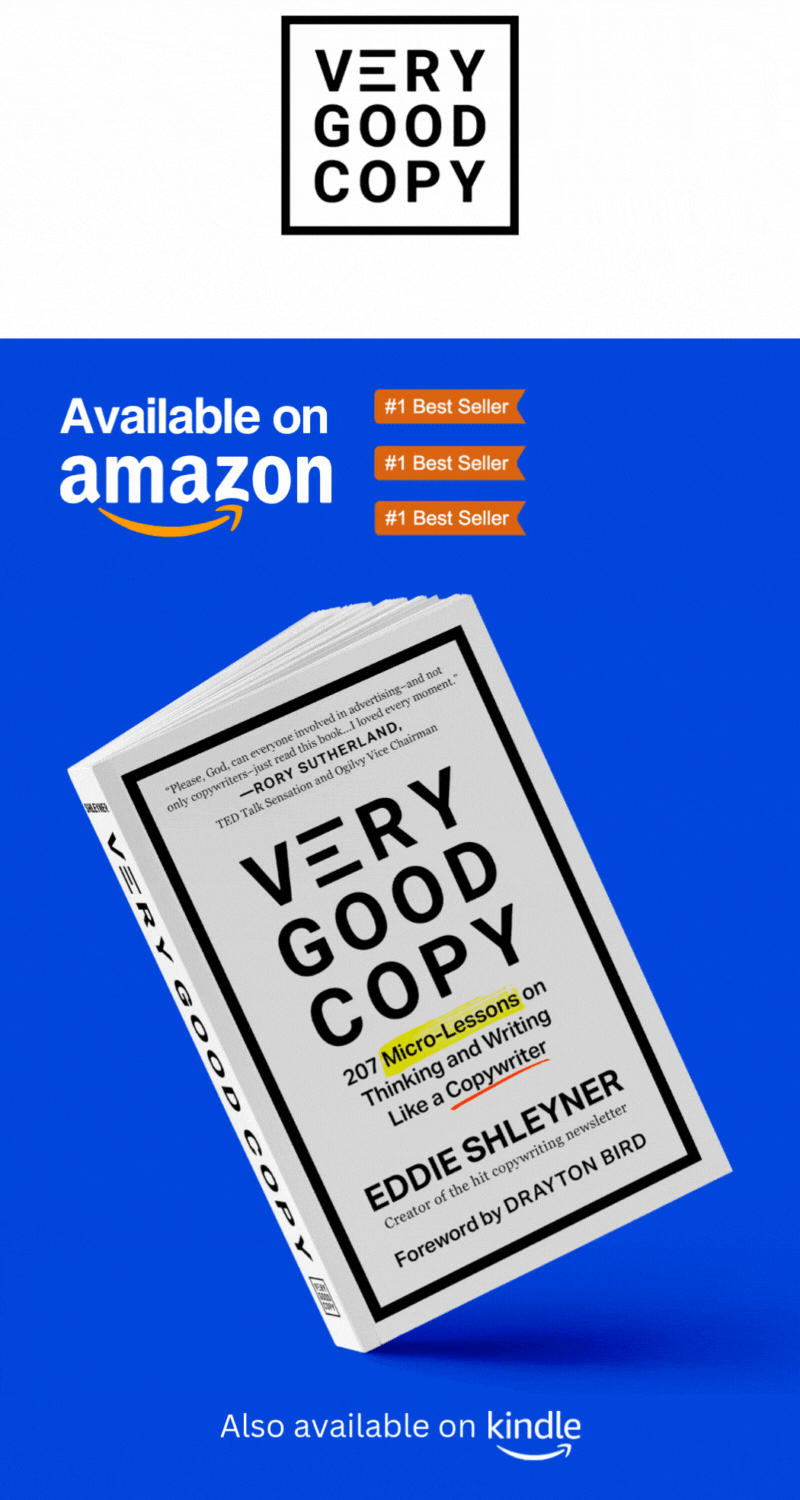EDITOR’S NOTE:
Learn from my copywriting mentor:
“Heyy,” I said, “can I getta gut check?”
Adam took off his headphones. “What?” he smiled.
“Quick gut check?” I smiled.
“Oh,” he said. “Yep. Send it over.”
“Just Slacked it.”
Adam opened his Slack and clicked my name. My Google doc appeared.
He read it. I hung back and looked at my phone.
“OK,” he said. I put my phone away. “Let’s talk.”
This scenario played out countless times when Adam Goyette was VP of Marketing at G2. I’d write up a promotion — a landing page; an email; a campaign strategy statement — then I’d send it to him.
No, Adam isn’t a copywriter. (At least not by title.)
But, in a way, he is.
Because he’s a perennial student of markets, large groups of people sharing a common need, or desire, or goal. And over time, he’s developed a facility, a sensitivity, for reading markets, for anticipating how certain people will feel and react when they see an offer, an opportunity...
And that’s the ultimate copywriting skill, really.
Hence, every time we talked through a promotion, the copy benefited. With every analysis, we found a way to improve the appeal, the offer, the response.
So yeh, he’s my copy mentor. Absolutely he is.
And now you can learn from him, too, in his excellent 512-word Micro-Interview.
Dive in. You’ll learn:
How to schedule your time for peak productivity…
How to go from “embarrassing” to “promoted” in 2 months...
The mindset necessary for achieving long-term career success…
And more…
Enjoy!
Instantly get 6 “micro” courses and series about copywriting when you subscribe to the VeryGoodCopy newsletter for free. Plus...enjoy new content every week. Learn more →
Thank you, Adam.
Let’s get started:
1) “What’s your work routine?”
In the past I’d let my day be chopped up by meetings, so I found myself unable to get big projects done without working nights or weekends. Having 6 thirty-minute openings throughout the day isn't nearly as valuable as a full 3-hour block of time.
So now I usually try to keep the first few hours of my mornings meeting free. That lets me have several hours of heads-down work time every single day. It’s done wonders for my productivity.
My afternoons are then pretty booked solid with meetings but the trade off is worth it.
2) “What do you know about your work now that you wish you’d known when you first started?”
To not be so passive. Nobody is looking out for your career but you.
I don't say that in a negative way. I was just a little naive early on in my career, thinking that if I just did a good job the rest would take care of itself. The reality is most of the opportunities I’ve received — new responsibilities, projects, promotions — were because I went out and asked for them.
Doing a good job is awesome but when you can couple it with some take-charge initiative, you’ll start really seeing things progress quickly in your career.
3) “What did your biggest professional failure teach you?”
Knowing the numbers = power.
I remember sitting in a big conference room with our CFO and CEO plus the Marketing and Sales leaders. We had just had one of the worst months in the company’s history.
The Sales and Marketing teams both came in finger-pointing. But no one actually knew the data. Or could really tell a story to our CFO or CEO that explained what happened.
The meeting ended in disgust, with our CFO calling it embarrassing and walking out.
I was so angry and embarrassed for even being a part of that meeting that I went home and stayed up until 4 a.m. digging through all of the Salesforce reports. I built out an analysis in PowerPoint and showed up at his desk the next morning. I looked like shit but I had a complete understanding of exactly why we missed.
Moving forward, that analysis was the backbone of all our Sales and Marketing meetings. And whenever there were any questions about what was happening, the leadership team came to me.
2 months later, I was promoted.
4) “What’s the #1 thing that has helped you shorten your craft’s learning curve?”
The easiest way I’ve found to broaden my knowledge and perspective is by talking to all the amazing marketers out there today.
At least twice a month I talk with other folks in Marketing, just to pick their brain. Because when it comes to Marketing, there’s almost nothing you’re planning on doing that someone else hasn't already done.
5) “What book has helped you the most over your career?”
Influence: The Psychology of Persuasion by Robert Cialdini.
6) “And your parting piece of advice?”
Same advice I give my 4 year old: “Be nice and have fun.”





